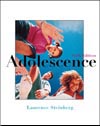Pick a risky behavior that teenagers are believed to engage in and find out whether they really do take more risks than adults. How might behavioral decision theory explain these differences? Do you think changes in their cognitive abilities make them more or less vulnerable to risk?
Adolescents are more likely to be injured or die from behaviors under their
own control than adults are. Why?
 |
1 |  | 
How is thinking more advanced in adolescence than in childhood? Check all that apply. |
|  | A) | Adolescents can think about the possible as well as the real. |
|  | B) | Adolescents' thinking becomes focused on one issue at a time. |
|  | C) | Adolescents are more likely to see things as relative, rather than as absolute. |
|  | D) | Adolescents become better able to think about abstract things. |
|  | E) | Adolescents can think about thinking. |
 |
 |
2 |  | 
What is the personal fable? |
|  | A) | The teenager's belief that he or she is the focus of everyone else's attention. |
|  | B) | The teenager's belief that his or her experiences are unique. |
|  | C) | The teenager's belief that everything is relative. |
 |
 |
3 |  | 
Adolescents are in which of Piaget's stages of cognitive development? |
|  | A) | Sensorimotor |
|  | B) | Preoperational |
|  | C) | Concrete operations |
|  | D) | Formal operations |
 |
 |
4 |  | 
Adam is able to study for a math test at the kitchen table while his parents prepare dinner. This example best illustrates the concept of |
|  | A) | Selective attention |
|  | B) | Divided attention |
|  | C) | Long-term memory |
|  | D) | Metacognition |
 |
 |
5 |  | 
__________________ is defined as thinking about people, social relationships, and social institutions. |
|  | A) | Information processing |
|  | B) | Scaffolding |
|  | C) | Social cognition |
|  | D) | Sensation seeking |
 |
 |
6 |  | 
16 year old Brent wants a car. He convinces his parents to buy him one by pointing out how much time they will save if they do not have to drive him to school, soccer practice, and work. His reasoning is an example of adolescent gains in |
|  | A) | impression formation |
|  | B) | social perspective taking |
|  | C) | understanding of social conventions |
|  | D) | moral reasoning |
 |
 |
7 |  | 
African-American and Hispanic-American students typically score lower on a standard IQ test than European-American students. This is probably because |
|  | A) | the test is not culture-fair |
|  | B) | minority students are less intelligent |
|  | C) | minority students are poor test takers |
|  | D) | the test did not cover kinesthetic intelligence |
 |
 |
8 |  | 
Why do adolescents engage in risky behavior? Check all that apply. |
|  | A) | Adolescents have poor decision making skills. |
|  | B) | Adolescents may have higher levels of sensation seeking. |
|  | C) | Adolescents evaluate the consequences of their actions differently than do adults. |
|  | D) | Contextual factors, such as attending a lot of parties where drinking occurs, may push adolescents towards risky behavior. |
|  | E) | Adolescents have poor information processing skills. |
 |
 |
9 |  | 
17 year old Jennifer understands the need to wait in line to buy stamps at the post office, but her 12 year old sister does not. Jennifer has a more developed understanding of |
|  | A) | social perspective taking |
|  | B) | formal operations |
|  | C) | social conventions |
 |
 |
10 |  | 
What are some advantages of the ability to engage in hypothetical thinking? Check all that apply. |
|  | A) | The ability to formulate and argue a viewpoint while thinking ahead of the opposition |
|  | B) | The ability to play devil's advocate |
|  | C) | A greater interest in thinking about concepts such as honesty, fairness, and faith |
|  | D) | The ability to plan ahead and think about consequences of actions |
|  | E) | An understanding of sarcasm |
 |



 2002 McGraw-Hill Higher Education
2002 McGraw-Hill Higher Education